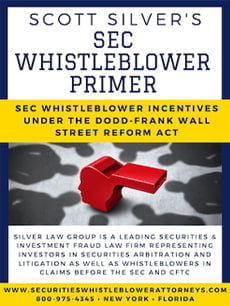SEC Whistleblower Program 2022 - Part 2
In a previous post, we began reviewing SEC’s recently-released analysis of FY2022 whistleblower submissions, focusing on the factors that may lead to a successful action and a resulting award. In today’s post, we’re looking at the factors that determine the amount of a whistleblower’s award.
The Starting PointAccording to the SEC’s Rule 21F-17, whistleblowers are entitled to 10-30% of the monetary sanctions recovered by the SEC and other authorities’ actions. If the maximum award is $5 million or less, the rule requires that the SEC operates with a presumption that the 30% should apply, although there can be exceptions.
In FY2022, the SEC issued awards pursuant to Rule 21F-17 for 90% of its successful prosecutions.
The Significance of the Information Has a Positive Impact on the Award AmountSignificance is the most important factor in determining the amount of an award, and it also is a factor when dividing an award between whistleblowers. During FY2022, the SEC used the significance of whistleblowers’ respective contributions to apportion awards in 14 covered actions.
Aid in Investigation Has a Positive Impact on the Award AmountWhistleblowers can increase their award amount if they provide substantial assistance at any point in the investigation. The types of assistance that may result in a larger award include:
- Identifying witnesses, documents, or other sources of information
- Analyzing transactions
- Communicating with SEC staff or enforcement authorities when appropriate
In one case, a whistleblower submitted a tip, and the SEC conducted what appears to have been a successful investigation. During that investigation, however, the SEC also discovered that the whistleblower made materially false statements in their initial report and in their award application. The SEC denied the claimant’s application for an award because whistleblowers must be forthright and transparent in submissions.
Culpability Can Have a Negative Impact on the Award Amount—But it May NotWhile the SEC has not revealed the context of that whistleblower’s false statements, the whistleblower may have lied to hide their culpability in the wrongdoing. If that was the case, it was a mistake.
Pursuant to SEC rules, the agency may reduce an award because of the whistleblower’s own culpability. In FY2022, it did so three times. As a general rule, though, culpability is not an automatic bar to a whistleblowing award. Lying to the SEC, on the other hand, is.
Timing Can Have a Positive or Negative Impact on the Award AmountIf a whistleblower comes forward with a tip about ongoing harm to investors, the SEC may decide to increase the amount because the whistleblower is helping prevent further damage.
Conversely, there may be penalties for waiting to report: In eight cases this year, the SEC reduced awards because whistleblowers had come forward only after an unreasonable delay. In two of those cases, the SEC considered a whistleblower’s delay in reporting to constitute their own culpability in the wrongdoing.
Reporting to Other Agencies Should Not (Ultimately) Have a Negative Impact on the Award AmountThe point of government whistleblowing programs is to encourage people who know of wrongdoing to come forward and report it. Awards properly incentivize and reward those who do. But there is occasionally a disparity in the way different agencies compensate whistleblowers. In the 2022 report, the SEC makes clear that new rule amendments allow the Commission to give additional compensation if a whistleblower received a smaller award from another agency than they would have if they’d filed with the SEC. Whistleblowers no longer need to use the size of a potential award as a decisive factor in determining which agency to report to.
The SEC’s report shows how vital whistleblowing is to the health of the securities marketplace, and that it can result in a significant gain for those who come forward. But it also shows that whistleblowing can be more complicated than simply alerting the SEC to a bad trade.
In light of these challenges, Silver Law Group and the Law Firm of David Chase have created a strategic alliance to represent SEC whistleblowers.
With years of experience representing SEC whistleblowers, and an SEC enforcement lawyer on our team, we have an in-depth understanding of the SEC Whistleblower Program. We understand what the SEC is looking for. We can help you submit a whistleblower tip that is more likely to trigger a successful SEC investigation, and we can help you make sure you receive the award you deserve. For a free, confidential consultation, contact us by email or call us today at (800) 975-4345.
 Silver Law Group Home
Silver Law Group Home
